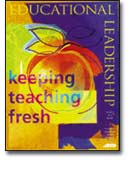A Response from Alberta
Although I appreciate Dale Wallace's interest in providing information about Alberta's provincial achievement tests, his article, "Results, Results, Results?" (Feb. 2000), included some inaccurate claims.
The achievement tests, developed on the basis of the provincial Programs of Study, recognize that intelligence is about more than remembering facts. Test blueprints, published for each grade and available on Alberta Learning's Web site, http://ednet.edc.gov.ab.ca/studenteval, provide evidence that only a small proportion of any achievement test requires the recall of information. In addition, teachers are extensively involved in the development of the tests, through item development and field-testing. Such involvement helps ensure that the tests reflect children's classroom experiences and the Programs of Study for particular grades.
No single assessment is adequate as a measure of a student's learning. We emphasize the limits of a single test in our guidelines for interpretation, which schools receive along with test results. We stress the importance of classroom assessments over an entire school year.
The author's statement that the department operates under the assumption that good test results mean that children are receiving a good education is also inconsistent with our thinking. We believe that good test results can help schools review their programs and improve students' learning. However, it is essential that we use the information from provincial tests in conjunction with other information available locally. To ensure a good education for students, and to help them become confident, successful learners, requires good teaching, including good assessment, together with support from parents and the community.
Here in Alberta, we are proud of our education system. Our students are doing well thanks in large part to the work of dedicated teachers. Working with our partners in education, we continue to find ways to improve our system.
—Lyle Oberg, Minister of Education, Edmonton, Alberta, Canada
Accuracy for Alberta?
Dale Wallace, in "Results, Results, Results?" (Feb. 2000), shared his perceptions of testing and accountability issues in Alberta, Canada. In an issue otherwise dedicated to how schools are attempting to use testing information to improve teaching and learning, Wallace's article seems out of place. Educational restructuring and reform in Alberta, of all Canadian provinces, has been fashioned on U.S. practices. Our experience with testing and accountability is not much different from that known to state systems.
For Wallace to emphasize that serious opposition to testing exists in the province, that the Provincial Government is interested in rewarding jurisdictions only for good test results, that all provincial media relish revealing comparative testing data is just not accurate. If he is correct that teachers "desire good results at any costs," he is certainly not speaking on behalf of school boards or parent groups. And if teaching to the test is widespread, individual practitioners have chosen that approach, not the district jurisdiction.
Some parents and some students are concerned, he reports. Some? Are they not everywhere? Cheating has increased here. Elsewhere, too? The problems we are having with this increased accountability are a shared concern. Our practice in the province is not unlike that known to our U.S. counterparts. For Wallace to write such an negative piece is not at all representative of the reality throughout most of the province of Alberta.
—L. J. Roy Wilson, Medicine Hat College, Alberta, Canada
Sustainable Improvement
In "Results Count in Los Angeles" (February 2000), Ilene Berman, Christopher Cross, and Joan Evans give the focus on results sole credit for raising the norm-referenced test scores of 64 percent of the schools in the Los Angeles Unified School District. The authors failed to mention that the bulk of the improvements occurred in schools receiving support through the Los Angeles Educational Alliance for Restructuring Now (LEARN). This professional development program brings systemic change to schools by engaging all stakeholders. The data show that LEARN schools outperformed non-LEARN schools across the board.
We should certainly applaud the district's standards-driven efforts. Where we had often seen confusion, we now see clear definitions and communication. However, without the teacher and administrator conversation taking place in LEARN schools, I doubt that the improvements would have occurred in a sustainable way.
—Dan Chernow, Executive Director, UCLA School Management Program Los Angeles, California
